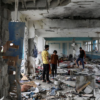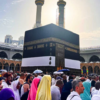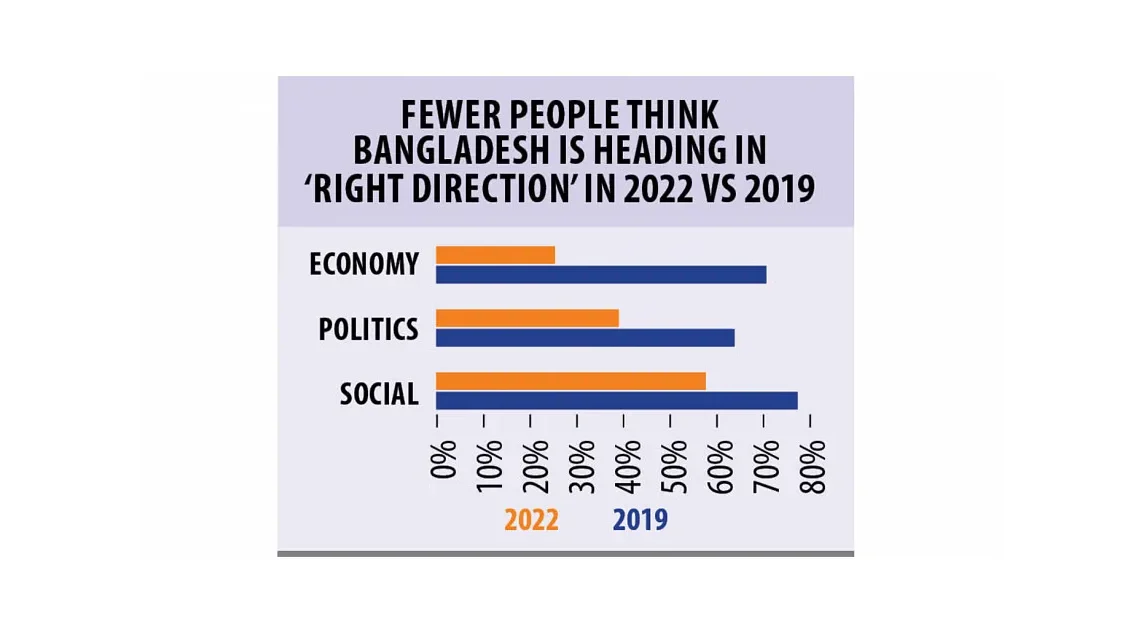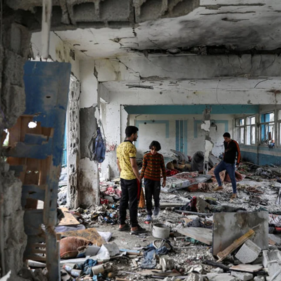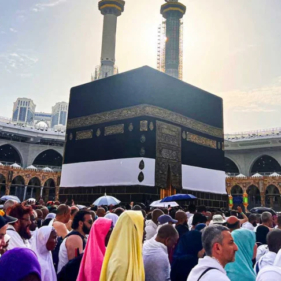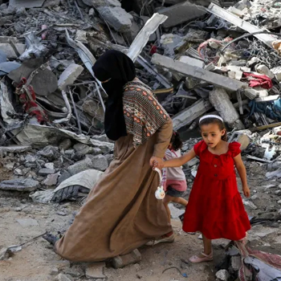According to a recent poll, up to 70% of participants believe that Bangladesh’s economy is going in the wrong way, and they attribute this opinion to the country’s high cost of goods.
The information was revealed in a research titled “The State of Bangladesh’s Political Governance, Development, and Society: According to Its Citizens,” which was carried out by the Brac Institute of Governance and Development and The Asia Foundation in Bangladesh together.
The most recent study, which was released yesterday, employed a divisionally representative survey with a sample size of 10,240 men and women that was carried out from November 2022 to January 2023 in all 64 districts.Identical polls were carried out in 2017, 2018, and 2019.
In all three spheres of a citizen’s life, the percentage of individuals who believed the country was moving in the right way is much lower now than it was in 2019, showing a major decline in public beliefs about the future of the nation.For instance, in 2019, 28% of respondents said that the nation’s economic course was bad.
Even while the majority of respondents from all income brackets believe Bangladesh’s Economy is going in the wrong way, those from the highest income bracket are the most gloomy.According to as many as 87 percent of respondents from the income bracket with the highest income, Bangladesh’s economy is heading in the wrong path.
The reasons given by the 70% of respondents who believe Bangladesh’s economy is going in the wrong way are: the high cost of goods (84%) the poor state of the economy (35%), the increased scarcity of necessities (25%), the lack of employment opportunities (16%), the low pay in comparison to the amount of work required (10%), the lack of decent employment opportunities (8%) and the decline in business (8%).
The top factors cited by the quarter of respondents who believe the nation is moving in the right direction are the strong economy (46 percent), overall development (36 percent), good infrastructure (27 percent), increased employment (16 percent), improved quality of life (14 percent), lack of a shortage (14 percent), improved business (11 percent), availability of various government allowances (10 percent), communications system improvements (9 percent), and improved el
When asked to name the greatest difficulties the nation is presently facing, the respondents gave the “price hike” as their top response, accounting for nearly 44% of the total.Business decline (11 percent), unemployment (10 percent), political unrest (8 percent), and corruption (3 percent) are among the other issues identified by the respondents.
The political orientation of the nation and whether they believe Bangladesh is moving in the right or incorrect way were questions that were posed to the respondents. 48 percent of respondents, up from 31 percent in 2019, said Bangladesh was moving in the wrong way.Additionally, from 5% in 2019 to 11% in 2022, the proportion of respondents who were unsure of the country’s direction.
When asked why they believe Bangladesh is headed in the right path, 39% of respondents responded in the affirmative. Only 51% believe Bangladesh is progressing in the right path because of political stability.
The other factors are: improved human rights conditions (20%), decreased political violence (15%), decreased terrorism (10%), and infrastructural development (2%). Overall development accounts for 22% of the total.
Instability (46 percent), the dominance of one political party (25 percent), price increases (20 percent), the lack of democracy (10 percent), votes cast against one’s will (12 percent), one-sided politics (10 percent), and a lack of opportunities for free speech (9 percent) are among the causes cited by the 48 percent of respondents who believe Bangladesh is politically headed in the wrong direction.Results suggest that 96% of people plan to cast ballots in the next elections.The poll investigates how people see democracy and democratic values.
More over a third of respondents (36%) acknowledge they “don’t know” when asked what they mean by democracy. Nearly one-fifth said that their definition of a democracy includes “equal rights for all” (18%), “people’s freedom” (17%), “government by the people” (15%), “the right to vote freely (15%),” “freedom of speech (15%),” and “public participation in all activities (7%)”.
With respondents with a bachelor’s degree or above being more likely to define democracy as the ability to vote freely (16%), equal rights for all (14%) and people’s freedom (12%), there are clear disparities by educational level.
Conversely, “don’t know” is the response given by 48% of respondents without a formal education. Respondents are more likely to state that they are unaware of what democracy is when income levels decline.From 77 percent in 2019 to 58 percent in 2022, fewer respondents said they thought Bangladesh was headed in the right direction socially, but the economy is going in the wrong way.
The following factors are cited by those who believe the nation is socially headed in the wrong direction: decline in law and order (64 percent), rise in corruption (23 percent), poor educational system (16 percent), rise in drug use (16 percent), torture of innocents (11 percent), rise in violence against women (9 percent), and concentration of power in the hands of the wealthy (7 percent).
In comparison to 63 percent who answered the same regarding posting about social concerns, as many as 73 percent said it is never or hardly ever safe to express political beliefs on Facebook.Most of the respondents receive news through private TV channels and follow news on Facebook. Only 25% of respondents claimed to read newspapers.Facebook news is more likely to be accessed by respondents who have at least an undergraduate degree (84%) than by respondents without any formal education (64%).
Overall, there is more trust in Facebook news (55%) than there is in newspapers (27%).The Padma Bridge project is seen as Bangladesh’s most important achievement by 72% of survey respondents.According to the research, while just 28% of respondents acknowledged the administration, 47% of respondents credited Prime Minister Sheikh Hasina for building the bridge.

